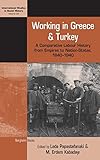Working in Greece and Turkey : A Comparative Labour History from Empires to Nation-States, 1840–1940 / ed. by M. Erdem Kabadayı, Leda Papastefanaki.
Material type: TextSeries: International Studies in Social History ; 33Publisher: New York ; Oxford : Berghahn Books, [2020]Copyright date: ©2020Description: 1 online resource (478 p.)Content type:
TextSeries: International Studies in Social History ; 33Publisher: New York ; Oxford : Berghahn Books, [2020]Copyright date: ©2020Description: 1 online resource (478 p.)Content type: - 9781789206968
- 9781789206975
- 331.09495/09034 23/eng/20231120
- online - DeGruyter
| Item type | Current library | Call number | URL | Status | Notes | Barcode | |
|---|---|---|---|---|---|---|---|
 eBook
eBook
|
Biblioteca "Angelicum" Pont. Univ. S.Tommaso d'Aquino Nuvola online | online - DeGruyter (Browse shelf(Opens below)) | Online access | Not for loan (Accesso limitato) | Accesso per gli utenti autorizzati / Access for authorized users | (dgr)9781789206975 |
Frontmatter -- Contents -- Illustrations -- Acknowledgements -- Introduction and Historiographical Essay: Greek and Turkish Economic and Social History, and Labour History -- Part I Agrarian Property and Labour Relations, Rural and Urban Organization of Work -- Chapter 1 Were Peasants Bound to the Soil in the Nineteenth-Century Balkans? A Reappraisal of the Question of the New/Second Serfdom in Ottoman Historiography -- Chapter 2 The ‘Invisible’ Army of Gree k Labourers -- Chapter 3 ‘No Work for Anyone in Thi s Country of Misery’ Famine and Labour Relations in Mid-Nineteenth-Century Anatolia -- Chapter 4 Rural Manufacturing in the Mid-Ninetee nth-Century Ottoman Countryside: Textile Workers in Three Plovdiv Villages -- Chapter 5 Ethno-religious Division of Labour in Urban Economie s of the Ottoman Empire in the Ninetee nth Century -- Part II Political Change, Migration and Nationalisms -- Chapter 6 Class Formation on the Modern Waterfront: Port Workers and Their Struggles in Late Ottoman Istanbul -- Chapter 7 Labourers, Refugees, Revolutionaries: Ottoman Perceptions of Armenian Emigration -- Chapter 8 The Greek Labour Movement and National Preference Demands, 1890–1922 -- Chapter 9 Refugees, Foreigners, Non-Muslims: Nationalism and Workers in the Silahtarağa Power Plant, 1914–1924 -- Part III Labour Market and Emotions in the Twentieth Century -- Chapter 10 ‘Fatherly Interest…’ Industrial Paternalism, Labour Management and Gender in the Textile Mills of a Greek Island (Hermoupolis, Syros), 1900–1940 -- Chapter 11 The Changing Organization of Production and Modes of Control, and the Workers’ Response: The Turkish Textile Industry in the 1940s and 1950s -- Chapter 12 ‘It Is Fair to Ask for the Imp rovement of Their Fate’ The Demands, Mobilization and Political Orientation of the Press Workers and Printers of Patras, 1900–1940 -- Chapter 13 Children’s Domestic Labour: Intimate Relations, Family Politics and the Construction of Identity of Domestic Workers in Interwar Greece -- Epilogue -- Index
restricted access online access with authorization star
http://purl.org/coar/access_right/c_16ec
As was the case in many other countries, it was only in the early years of this century that Greek and Turkish labour historians began to systematically look beyond national borders to investigate their intricately interrelated histories. The studies in Working in Greece and Turkey provide an overdue exploration of labour history on both sides of the Aegean, before as well as after the fall of the Ottoman Empire. Deploying the approaches of global labour history as a framework, this volume presents transnational, transcontinental, and diachronic comparisons that illuminate the shared history of Greece and Turkey.
Mode of access: Internet via World Wide Web.
In English.
Description based on online resource; title from PDF title page (publisher's Web site, viewed 25. Jun 2024)


